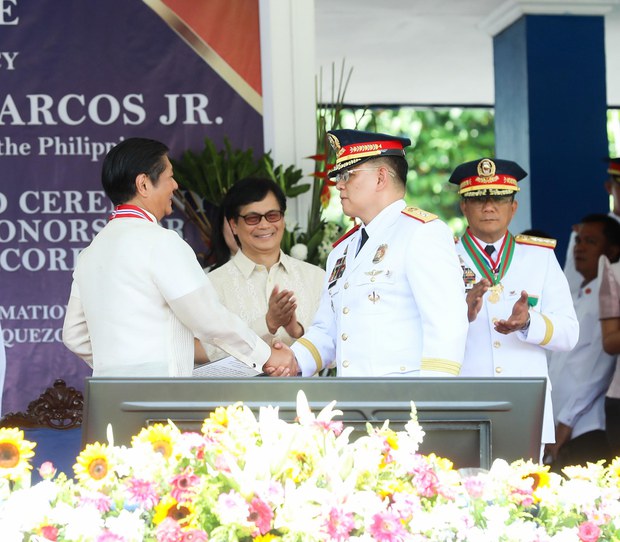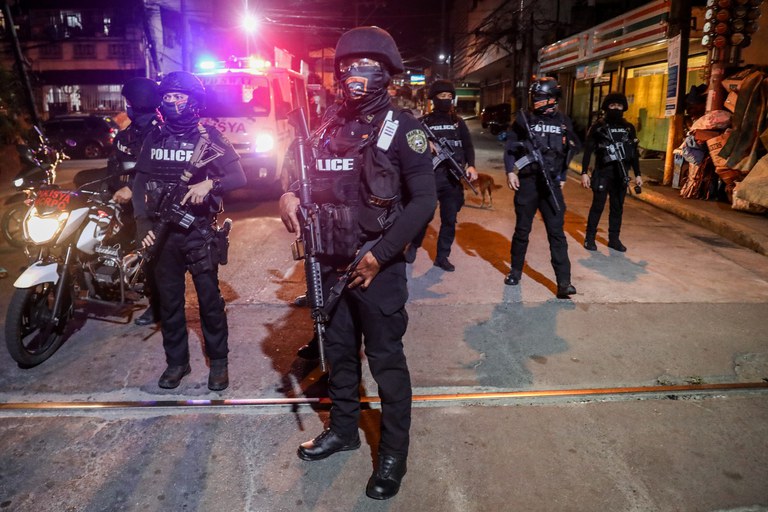Philippines gets a new police chief
2024.04.01
Manila
 Philippine President Ferdinand Marcos Jr. shakes hands with Maj. Gen. Rommel Francisco Marbil, the new head of the Philippine National Police, during an induction ceremony at PNP headquarters in Quezon City, Philippines, April 1, 2024.
Philippine President Ferdinand Marcos Jr. shakes hands with Maj. Gen. Rommel Francisco Marbil, the new head of the Philippine National Police, during an induction ceremony at PNP headquarters in Quezon City, Philippines, April 1, 2024.
The Philippines’ new police chief pledged to be accountable and transparent in fighting crime and leading the 230,000-strong national force, as President Ferdinand Marcos Jr. inducted him into the post Monday.
Maj. Gen. Rommel Francisco Marbil becomes the third chief of the Philippine National Police (PNP) to serve under Marcos since the president took office in mid-2022. Marbil, a 1991 graduate of the elite Philippine Military Academy, replaces police Gen. Benjamin Acorda, who officially retired on Monday.
“We need officers who recognize that it is simply not enough to act decisively, relentlessly, and fast in the war against crime, but that there must also be accountability and transparency on our end,” Marbil said during his induction speech at PNP headquarters in Quezon City, Metro Manila.
Acorda’s tenure was uneventful and came as the PNP was dealing with accusations from human rights groups that the police were guilty of abuses tied to ex-President Rodrigo Duterte’s controversial war on illegal drugs.
The crackdown on narcotics has continued under the Marcos administration, but while some shootouts have occurred, extrajudical killings no longer are being recorded every day. Marcos has publicly stated that the drug war would focus on rehabilitating people instead of pursuing Duterte’s scorched earth approach.
Marcos, who swore in Marbil on Monday, made no reference to the drug war, but assured the new police chief of his full support “as you begin to champion a police force that is pro-God, pro-country, pro-people, pro-environment.”
“With Police General Marbil as our 30th PNP chief, I enjoin everyone to face the coming days with even greater fervor, determination, and optimism to achieve our goals and aspirations for the nation,” Marcos said.

Marcos is under pressure from human rights groups to allow International Criminal Court (ICC) investigators into the country to carry out an investigation into Duterte’s drug war.
It left some 8,000 suspected drug dealers and addicts dead during his six-year term (2016-22), according to statistics kept by Philippine authorities. Rights groups say that number is understated and could be three times higher.
A former regional police director for Eastern Visayas in the central Philippines, Marbil, 55, was born in Manila on Feb. 7, 1969. He formerly served as head of the country’s Highway Patrol Group (HPG).
His term will end next year after he turns 56 – the mandatory retirement age in the force. Among his previous postings was as the provincial police chief of Agusan del Norte in the south, an area where communist rebels and Muslim militants operate.
Marbil, however, did not mention how he would handle active-duty police officers who had been involved in the drug war under Duterte.
In his speech on Monday, he assured the public that his command would deliver “quality leadership” to improve public trust.
He said he would expand “our ability to uphold the law, maintain order, and fight local and transnational crimes in all forms and manifestations.”
“To this end, we commit to utilizing the best and innovative practices in law enforcement,” he said.
The force would “focus on increased community satisfaction in our work as a key benchmark of our progress,” Marbil said.
Duterte, 79, is facing two complaints at the ICC. One was filed by a former police officer, a self-styled assassin who accused Duterte of ordering the deaths of opponents and criminals when Duterte served as mayor of southern Davao city.
The second was filed by relatives of people killed during Duterte’s anti-drug campaign while he served as president.
In 2021, an investigation by the justice department said that in many cases, police officers involved in the killings did not follow protocol and could be prosecuted. Four police officers have been convicted of murder linked to drug-war killings.
‘I will kill you’
Last week, Duterte’s son, Sebastian Duterte, who is the current mayor of Davao City in the south, echoed his father’s past words by sending a warning to drug addicts and pushers.
“I repeat, if you don’t leave the city, if you don’t stop drug peddling, I will kill you,” Sebastian Duterte said. “I can’t afford that the family, the communities would be destroyed just because of your selfish venture. You just want to get rich by selling drugs, then you harm other people because of your greediness, then I will kill you.”
The mayor, whose older sister, Sara Duterte, is the country’s vice president, said that drugs ironically remained a problem in Davao, despite his father’s tough approach against illegal drugs.
Carlos Conde, a senior Asia researcher for Human Rights Watch, said they were deeply concerned with the declaration by Duterte’s son, saying it would only worsen an already dire human rights situation in Davao.
“Needless to say, and as we have seen during the time of his father Rodrigo as president, the “drug war” has been catastrophic particularly for poor Filipinos often targeted by the authorities in bloody drug raids,” Conde has said.
Basilio Sepe and Gerard Carreon contributed reporting from Manila.







